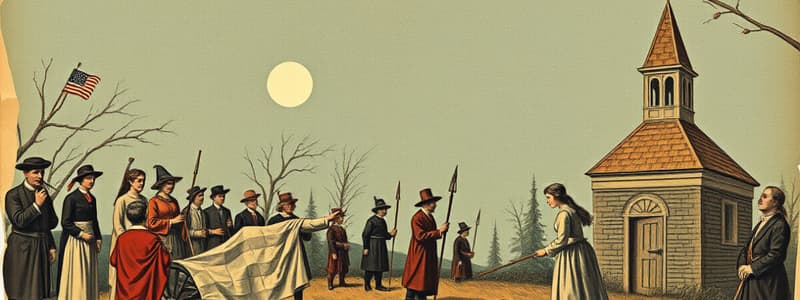Podcast
Questions and Answers
What was the First Great Awakening?
What was the First Great Awakening?
- A political uprising
- A scientific revolution
- A literary movement
- A revival movement in the 1730s and 40s (correct)
Who is often credited with starting the First Great Awakening?
Who is often credited with starting the First Great Awakening?
Jonathan Edwards
The First Great Awakening emphasized outward actions as proof of salvation.
The First Great Awakening emphasized outward actions as proof of salvation.
False (B)
Who was George Whitefield?
Who was George Whitefield?
What was the impact of the Great Awakening on religious affiliation?
What was the impact of the Great Awakening on religious affiliation?
What actions did James Davenport take to demonstrate his beliefs?
What actions did James Davenport take to demonstrate his beliefs?
The First Great Awakening was a reaction against the waning of religion and the spread of _____ during the Enlightenment.
The First Great Awakening was a reaction against the waning of religion and the spread of _____ during the Enlightenment.
Flashcards are hidden until you start studying
Study Notes
First Great Awakening
- Occurred in British North America during the 1730s and 40s, emphasizing personal faith over traditional religious practices.
- Promoted human choice in religion and morality, challenging the Puritan emphasis on outward actions as a measure of salvation.
- Aimed to purify religion from material distractions and renew individual relationships with God.
Awakened Preaching
- Preachers held revivals outdoors or in large tents, attracting thousands with emotionally charged messages.
- Revivals marked a sharp departure from the austerity of Puritanism and Anglican rituals, appealing to a diverse audience.
- Events were characterized by drama and unexpected elements, making them popular among the American public.
George Whitefield
- Evangelist known for his energetic preaching style, aimed at eliciting personal and emotional responses from listeners.
- Encouraged self-reflection among congregants, moving away from the Puritan custom of judging others for moral failures.
- Credited with pioneering public preaching due to restrictions from the Church of England, emphasizing a need for genuine emotional engagement in faith.
Jonathan Edwards
- Credited with initiating the First Great Awakening through his 1741 sermon "Sinners in the Hands of an Angry God."
- His sermons focused on the dire consequences of sin and the need for repentance, often using vivid and frightening imagery.
- This sermon became a cornerstone of early American literature, illustrating the intense emotions surrounding religious awakening.
James Davenport
- A notable traveling preacher who organized public events to burn items deemed distracting or sinful, such as luxury goods and non-religious books.
- Controversially stripped down and burned his pants to demonstrate rejection of vanity, which alienated many followers.
- Like Puritan predecessors, he emphasized a strict opposition to worldly influences and moral decay.
Legacy of the Awakening
- Shifted religious practices from tradition-bound systems to personal choice, leading to the formation of new denominations.
- Resulted in significant religious diversity across American colonies by the 1760s, reshaping established churches.
- Challenged social hierarchies by promoting egalitarianism in church services, welcoming all individuals, including enslaved people, into dialogue about salvation.
- Questioned established doctrines, suggesting differences in beliefs were subjective rather than essential to salvation.
Studying That Suits You
Use AI to generate personalized quizzes and flashcards to suit your learning preferences.




